
Atheism & Humanism
No se pudo agregar al carrito
Solo puedes tener X títulos en el carrito para realizar el pago.
Add to Cart failed.
Por favor prueba de nuevo más tarde
Error al Agregar a Lista de Deseos.
Por favor prueba de nuevo más tarde
Error al eliminar de la lista de deseos.
Por favor prueba de nuevo más tarde
Error al añadir a tu biblioteca
Por favor intenta de nuevo
Error al seguir el podcast
Intenta nuevamente
Error al dejar de seguir el podcast
Intenta nuevamente
Prueba gratis de 30 días de Audible Standard
Selecciona 1 audiolibro al mes de nuestra colección completa de más de 1 millón de títulos.
Es tuyo mientras seas miembro.
Obtén acceso ilimitado a los podcasts con mayor demanda.
Plan Standard se renueva automáticamente por $8.99 al mes después de 30 días. Cancela en cualquier momento.
Compra ahora por $4.00
-
Narrado por:
-
Virtual Voice
-
De:
-
Bob Kowalski

Este título utiliza narración de voz virtual
Voz Virtual es una narración generada por computadora para audiolibros..
Atheists are the most disunited minority in the universe, so I started what has become this book with a critical text on the foundations of atheism, an investigation into the reasons for this disunity, an atheist's text for atheists, words that struggle to demonstrate the true meaning and origin of atheism. For me, the atheist movement will only come out of puberty when there is a self-assertive critique capable of coherently constructing an atheist identity.
Most atheists these days are like eternal teenagers, they think that one dictionary definition is enough to instantly become a complete atheist. They consider themselves atheists and assume an incoherent brand of individualist rebels asserting a supposed absolute freedom; and, in this way, in the illusion of total freedom in atheism, without seeking the logical coherence of their ideas, they end up reproducing religious values, supernatural and incoherent beliefs. These kind of atheists don't study and are a disgrace.
An unbeliever must study religion to become a full atheist. A religious must also learn a little about atheism to maintain their faith. An army must always know its opponents to have a good strategy, otherwise it would be a long shot. If you don't like some subject, you shouldn't run away from these ideas, quite the contrary, you should learn a little to try to refute, disagree, or agree on a miserable point, anyway, otherwise, you're just someone superficial and ignorant who rejects everything just because you heard it around. Any discussion must respect logic, if you do not accept a statement you must counter it with another argument and not something subjective and baseless. It is necessary to be open to dialogue so as not to fall into the error of considering irrational everything that does not match our limits of perception.
Who is the book "Atheism & Humanism" suitable for?
1. Atheists looking for more depth:
Strengthen convictions: The book offers a solid foundation for questioning religious beliefs and strengthening atheist identity.
Expand knowledge: Explore scientific arguments that support the atheistic worldview and refute religious dogmas.
Uncover the history of atheism: Understand the evolution of atheistic thought over time and its role in society.
2. Interested in religion, philosophy and science:
Critical view of religion: Analyze the weaknesses of religious arguments and the contradictions between faith and science.
Dialogue between faith and reason: Explore the relationship between religious beliefs, the scientific method and the search for knowledge.
Scientific basis of atheism: Understand how scientific principles underlie the atheistic worldview. Uncover the nuances of atheistic thought and the different currents that make it up.
Dialogue between science and society: Explore the challenges and opportunities of dialogue between science and faith in today's society.
3. Anyone seeking knowledge:
Worldviews: Understand the different perspectives on the origin of life, the universe and the existence of a superior being.
Faith and Secular Life: Explore the role of faith and religion in modern society and individual lives.
Critical thinking: Develop critical analysis and questioning skills, essential tools for the search for knowledge.
Todavía no hay opiniones


